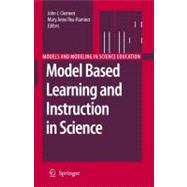
Model Based Learning and Instruction in Science
by Clement, John J.; Rea-ramirez, Mary Anne-

This Item Qualifies for Free Shipping!*
*Excludes marketplace orders.
Rent Textbook
Rent Digital
New Textbook
We're Sorry
Sold Out
Used Textbook
We're Sorry
Sold Out
How Marketplace Works:
- This item is offered by an independent seller and not shipped from our warehouse
- Item details like edition and cover design may differ from our description; see seller's comments before ordering.
- Sellers much confirm and ship within two business days; otherwise, the order will be cancelled and refunded.
- Marketplace purchases cannot be returned to eCampus.com. Contact the seller directly for inquiries; if no response within two days, contact customer service.
- Additional shipping costs apply to Marketplace purchases. Review shipping costs at checkout.
Summary
Table of Contents
| Introduction | |
| Student/Teacher Co- Construction of Visualizable Models in Large Group Discussion | |
| An Instructional Model Derived From Model Construction and Criticism Theory | |
| Determining Target Models and Effective Learning Pathways for Developing Understanding of Biological Topics | |
| Co-Construction and Model Evolution in Chemistry | |
| Target Model Sequence and Critical Learning Pathway for an Electricity Curriculum Based on Model Evolution | |
| Case Study of Model Evolution in Electricity: Learning From Both Observations and Analogies | |
| A Competition Strategy and Other Discussion Modes for Developing Mental Models in Large Group | |
| What if Scenarios for Testing Student Models in Chemistry | |
| Applying Modeling Theory to Curriculum Development: From Electric Circuits to Electromagnetic Fields | |
| Developing Complex Mental Models in Biology Through Model Evolution | |
| Role of Discrepant Questioning Leading to Model Element Modification | |
| Using Analogies in Science Teaching and Curriculum Design: Some Guidelines | |
| Model Based Reasoning Among Inner City Middle School Students | |
| Six Levels of Organization for Curriculum Design and Teaching | |
| Table of Contents provided by Publisher. All Rights Reserved. |
An electronic version of this book is available through VitalSource.
This book is viewable on PC, Mac, iPhone, iPad, iPod Touch, and most smartphones.
By purchasing, you will be able to view this book online, as well as download it, for the chosen number of days.
Digital License
You are licensing a digital product for a set duration. Durations are set forth in the product description, with "Lifetime" typically meaning five (5) years of online access and permanent download to a supported device. All licenses are non-transferable.
More details can be found here.
A downloadable version of this book is available through the eCampus Reader or compatible Adobe readers.
Applications are available on iOS, Android, PC, Mac, and Windows Mobile platforms.
Please view the compatibility matrix prior to purchase.